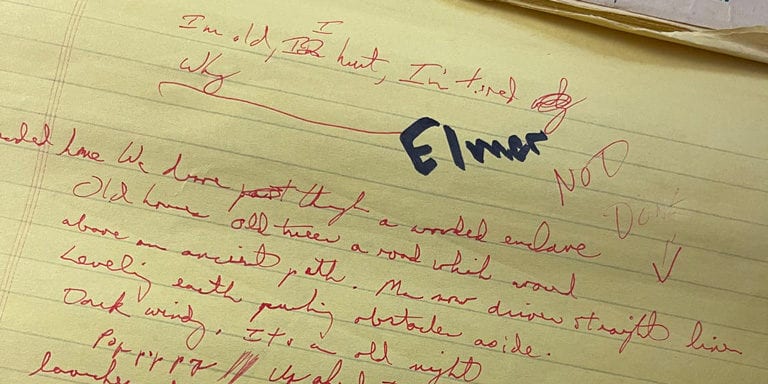
It is summer time. So many days in the 90s. Desks and stations are empty—so many people gone for a week or two.
This week’s story (plus a new chapter in the Round and Round series) has to be turned in on Wednesday. Early deadlines for many reasons.
I go away Saturday night. So if there is a new story next week, it will be posted from Iceland! Should be cooler there.
The weekend was a complete grind. So many carts had been built for me. Many were done in the traditional way—sorters putting old or very unusual books they’ve discovered when emptying boxes we have bought at the stores or on house calls. But many I assigned to be loaded from pallets which I knew would contain a preponderance of things that would come my way anyway.
These included the 160 or so boxes I’d picked up in Crozet, Virginia. It is far different looking at books one at a time from a collection you’ve first inspected shelved on dozens of bookcases throughout a sprawling mid-19th century farmhouse. The 15,000 books the venerable doctor had collected over his 95-year span were like a forest in situ. Looking at the vast array of book spines, the mind and eyes and perception are overwhelmed. Going through the 200 or so individual volumes placed on a cart—looking at each spine and, if necessary, pulling a book off for closer inspection, the collection becomes much more personal. Each “tree” gets “seen.”
There are a lot of good books. Nothing great so far. My first estimation has proved out so far. Many are going to the stores where they will be seen in person by booklovers and taken home to be their own. Customers at the stores will be happy. This vast literate collection was well curated.
Saturday night, I had a second birthday dinner with family at Lightfoot in Leesburg, Virginia—not far across the Potomac. I’ve had some memorable evenings there for over twenty years. The venerable stone and wrought-iron former bank building is unchanged since its transformation into a high-class restaurant. As a bank, the building was imbued with confidence-establishing features. Customers felt reassured by the heavy stone walls soaring 30 or more feet to a carved wooden ceiling.
This place is solid. A cathedral of commerce.
Its walls are now draped with French Art Nouveau posters. Almost all advertise liqueurs and aperitifs. Artifacts from a golden age in a golden era’s building. Two vastly different types of creations now wedded for 21st century enjoyment of food and drink.
Many of the posters are enormous. 8′ by 10′?
Sunday, back to the carts. I hadn’t switched to wearing shorts yet and paid for it uncomfortably.
My tailbone, which I thought immune from sitting on hard stools for so many years, ached. Maybe I’ll invest in a cushioned stool.
The tubs containing the collectible books culled from children’s glass cases at the Frederick had appeared. I peeked in a top one and saw about 2-dozen different editions of Alice in Wonderland in one. A young woman here collects that sort of thing. I’ve seen her picks on hold shelves where people here place the books they want to take home. I made a note to point them out to her. I’m not sure what we are going to do with all those collectibles. We removed them because they hadn’t sold—some sitting in the cases for years—some for many years—waiting.
On Tuesday, I caught up with her and explained the situation. She must have thought it odd because I rarely speak to so many people here—well, there are SO many.
“Don’t pay any attention to the prices on them. They will be cheap.”
When I went to the office after most people had left, I saw she had found a little stack.
Good! She deserves it. The books deserve it. Part of the problem solved!
Now what to do with the 500 or so remaining?
COVID presented so many of us with the opportunity to get to things that had been put aside. Garages, basements, attics.
For me, it was papers. Tubs, stacks, sprawls.
I recorded a lot of old verse—deciphering my old manuscripts and sometimes being stumped by a word I could not make out—either by the letters or the context.
I went through a lot of legal pads—some written upon many years ago. Some only had a page or two with manuscript. Others were nearly full—even the cardboard backing might be covered in ink.
This legal pad caught my eye recently.
ELMER
The crazy colonel.
A lost story I hadn’t recorded in the several Bookends “books” I’d written from the late 90s til 2010 or so.
It was unforgettable, and I was glad to have found pages of notes recording the highlight.
It was 2004. We had recently moved into the old warehouse on Frederick’s north side. It had been built by a large distribution company—Frederick Trading. We took 36,000 square feet of the 250,000 square foot building. The landlord demarked our space for us with a vast plane of white drywall rising to metal joists some 2-dozen-feet off the concrete floor.
Internet sales were booming. We were desperately seeking more and more books. We couldn’t keep up with demand. It was like a mighty steam engine which required more and more books to stoke its progress.
(Now we are in a 130,000 square foot warehouse, and we cannot keep up with the books coming in. Not enough or too much. Story of my life.)
I got a call for a large collection of books in Fairfax, Virginia. It was late fall, and the leaves were off the trees.
I turned into the woody enclave of mid-century suburban homes. Some were tired. Aging residents had let their places go. Others had been updated by new owners. Roofs raised. Cathedral ceilings. Huge floor to ceiling windows. New modern brick or faux-stone facades replacing the aluminum siding. (My parents had the Rockville house wrapped in aluminum in the 1960s. I remember the flashy salesman assuring them it would last forever. A lifetime warranty was just the beginning.)
I met a fellow, Ted, in the driveway.
“I’m just a neighbor,” he said. “I’m trying to help Daisy—Elmer’s widow. She’s in a nursing home.”
This was a tired house. Its clapboard style aluminum siding was off-white with age.
He let me in the front door, and we toured the large ranch-style house. It was built into a slope. One level at the front. Two levels in the back. The back looked into scruffy suburban woodland.
It was bizarre.
I’ve been to so many dysfunctional book houses.
All happy book collections are alike; each unhappy book collection is unhappy in its own way.
“Elmer was a retired colonel. He and Daisy moved here in the 60s when this street was developed. I did too. He went a little crazy in the last decade or so.”
One former bedroom on the lower ground level had books stacked floor to ceiling. Stacks and stacks. A mass of loose books piled 8-feet high and flowing out from a corner another 8 feet.
I’d never seen anything like it.
I stepped closer to look at titles. At the base of each spine, an American flag decal was affixed. I tried removing one. It would not come off.
‘Hmmmm…how will we describe that feature online?’ I thought. ‘Cut and paste “This book has an American flag decal permanently attached to the base of its spine.”‘
In another room, Elmer had built flimsy wooden bookcases and set them on casters. The bookcases were pushed up against each other, one after another. To access them, he could just roll them out. (And hope they wouldn’t topple over!)
‘Efficient. But to what purpose?’ I thought. ‘To squeeze more books in, obviously.’
“Poor Daisy. She’s from Japan. I can’t imagine what the last years were like for her here.”
Another room used the bricks and planks system of building bookcases. Elmer’s system used 10-foot planks. 3 or 4 bricks stacked on their edges at the ends. More bricks stacked a few feet from either end to keep the shelves from sagging too much. These went to the ceiling as well and just screamed “precarious.” The whole thing could come down like a Jenga tumble upon whoever was unloading them.
It was then I saw the hanging files. Elmer had rigged wooden and metal closet rods from the ceiling. Using wire, he had attached them securely to the wooden joists. Hundreds of sheets of 8 1/2 x 11″ sheets of paper were hung from the rods using metal clips clamped over hundreds of metal coat hangers.
The Hanging Gardens of Elmer Land.
Some were in color-coded files. Some were just clusters of papers. Some Elmer had written subjects on the cover sheet or the front of the file. Others had Post-Its dangling from a page bottom:
“Senator Byrd” “Colonel North” “CIA” “Kerry” “Fairfax County Engineer” …
“His filing system.” Ted was at my side. Both of us staring at the reams of paper hanging from the ceiling.
“May I look at some?”
“Whatever you don’t take is just going into the trash.”
“Vietnam POWs MIAs” “Poppycock” “I am an expert” “Worst design I’ve ever seen” “The so-called widening of Claylick Rd” “If you have difficulty understanding my requests” “I’d be happy to show you in the field” …
Ranting and raving. Reams of single-spaced typing. Every public servant’s nightmare.
Much of the correspondence had rubberstamped messages on them.
Some were basic: “1991” “Copy” …
Others bizarre: “Mikhail Gorbachev Still Wears Red Underwear” “My Book on Boris is Blank” …
“He actually went out made stamps like this?”
“Elmer spent a lot of money on photocopies and office supplies,” Ted responded. “That and books.”
There were goofy stamps too. Olive Oyl’s face with “Please Try Harder” below it. Bluto saying “Please See Me”
He had some responses too. Senator John Kerry heading a POW-MIA Committee asking Elmer to forward the documents he said he had; that “if they were germane to the investigation [he would] be subpoenaed and deposed for the good of the country and the prisoner’s families…”
“Do you know why he bought the books?”
We were now standing before a sofa with a sloppy 5-foot pyramid of books piled high atop it.
Ted bent and picked up some business cards from the side table.
“The Center for United States Historical Studies
Elmer C Collins
Historian
P O Box …”
“The Elmer and Daisy Schmidt Library Foundation
Elmer ‘Books’ Collins
Director
P O Box …”
“Who us Schmidt?”
Ted shrugged.
In Day Glo pink:
“The Center for the Study of Revolution…”
In white:
“Elmer Schmidt
Tennis Lessons
P O Box…”
I laughed out loud. “Really?!”
“This is a favorite,” Ted said. It read:
“The Society to Stamp Out Stupidity P O Box…”
“And he used aliases…”
“There are many more business and other ventures too. What he bought the books for, who knows? Elmer didn’t know. But he kept on buying them right up til the end.”
“The ultimate crank.”
“One time I saw him chasing the UPS truck down the street. He smashed the side mirror with his fist. Poor Daisy.”
Ted led me further and further into the madness.
The tour ended out in the huge two-car garage. Hundreds of Barnes and Noble plastic bags were tossed onto the floor. I picked one up and opened it. Pristine new books. He would buy books, bring them home and toss them into the garage. Over and over and over again. A small sailboat in the back corner belied there had been a time when there was sanity here.
The stacks of bags piled onto the roof and trunk of the long dead Buick Elektra 225 attested to a final pathological phase.
Raccoons were living in part of the garage and everything in that area was chewed and soiled and ruined.
We stepped out into the driveway. Cool autumn sunlight bathed normalcy upon the two of us.
“There’s no way to estimate the number of books in there.”
“Doesn’t matter. We need to sell the real estate. Daisy needs money to stay in the nursing home.”
We made 5 or 6 trips down. 1 van. 1 24-foot rental truck. 4 guys. I drove the truck. One of the helpers kept mumbling to himself as we packed and carried boxes out. Over time, the rooms emptied out.
Another helper got hurt when a brick fell on his shoulder from a bookcase he was dismantling but soon recovered. I took his place and standing on a chair gingerly dismantled the book-holding device book by book and brick by brick.
When we were leaving, Ted was in the front yard. He was bent over two cats and was rubbing their coats.
“Elmer and Daisy’s cats. They’re nice. Live outdoors. I’m looking for a good home…”
They were feral almost certainly.
“I hope you find one.”
The last trip for us all was in December. The truck that nearly filled the little driveway had to be maneuvered so no one would have to walk across the patches of ice on it.
I went back the next week by myself to mop up the stragglers. I also wanted to go to the nearby Trader Joes. In Maryland, they can’t sell wine. The Virginia location had the infamous “2 Buck Chuck.” I wanted to get a case of it since I rarely go to the state.
My tastes have “matured” since then.
Ted met me and asked about the cats again. I nearly gave in.
I wandered through the emptying dysfunctional home of madness. Someone would gut the place, and any vestiges of Elmer’s pathology would be erased. I don’t think it would be haunted. Elmer was likely onto bigger and better things. He had many ambitions, and freed from mortal coils, nothing could restrain him.
Outside chatting with Ted, I felt something brush against my ankles. A cat.
‘Nope,’ I thought. ‘They’re bound to be crazy.’
For years—at the stores or the warehouse—I’d come across books with American flag decals affixed to the base of their spines. I’d know just where they’d come from.
(There were many more pages of notes on Elmer. All scratched out on a yellow legal with red ink as I was wont to use in those days. But I need to send this off. Summer vacations are calling…)
Coincidentally, I’ve watched King Lear over the last couple nights. Shakespeare’s tale of madness brought on by age and frustration is a cautionary tale.
Hold yourself together and do whatever you are able to avoid that slippery slope.
Some new friends arrive from my last California trip. It took me a while to unpack them.
I can’t resist beautiful books.
Books—they abide—eternally with a bit of care.
So few things last forever—unlike aluminum siding.

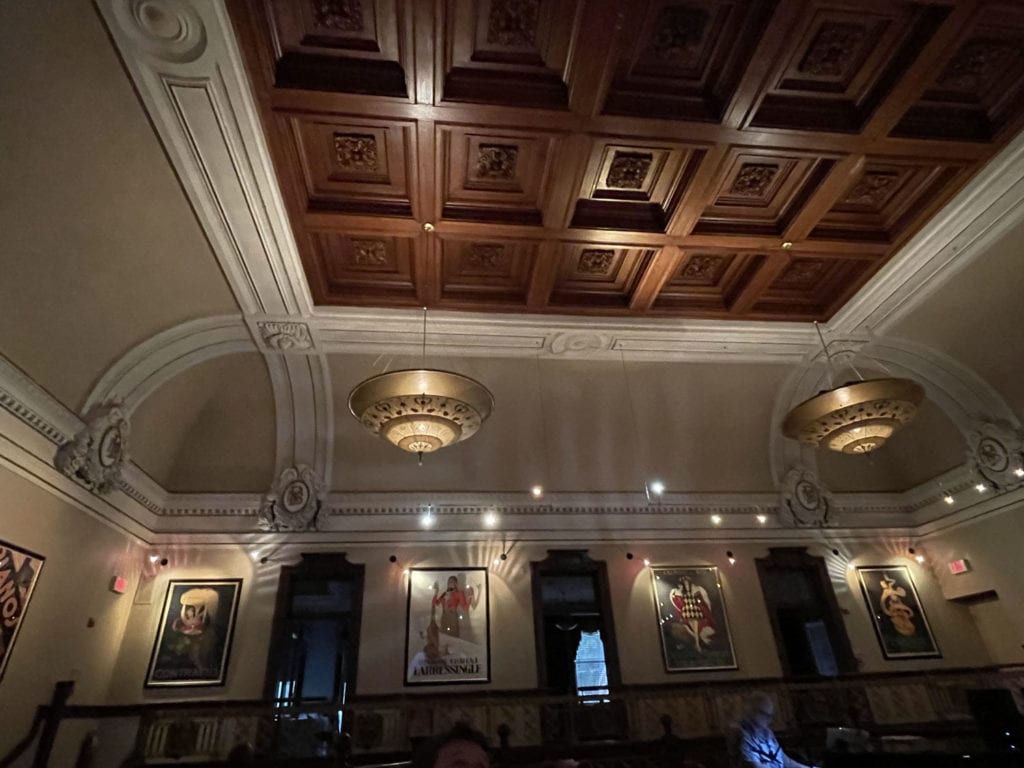
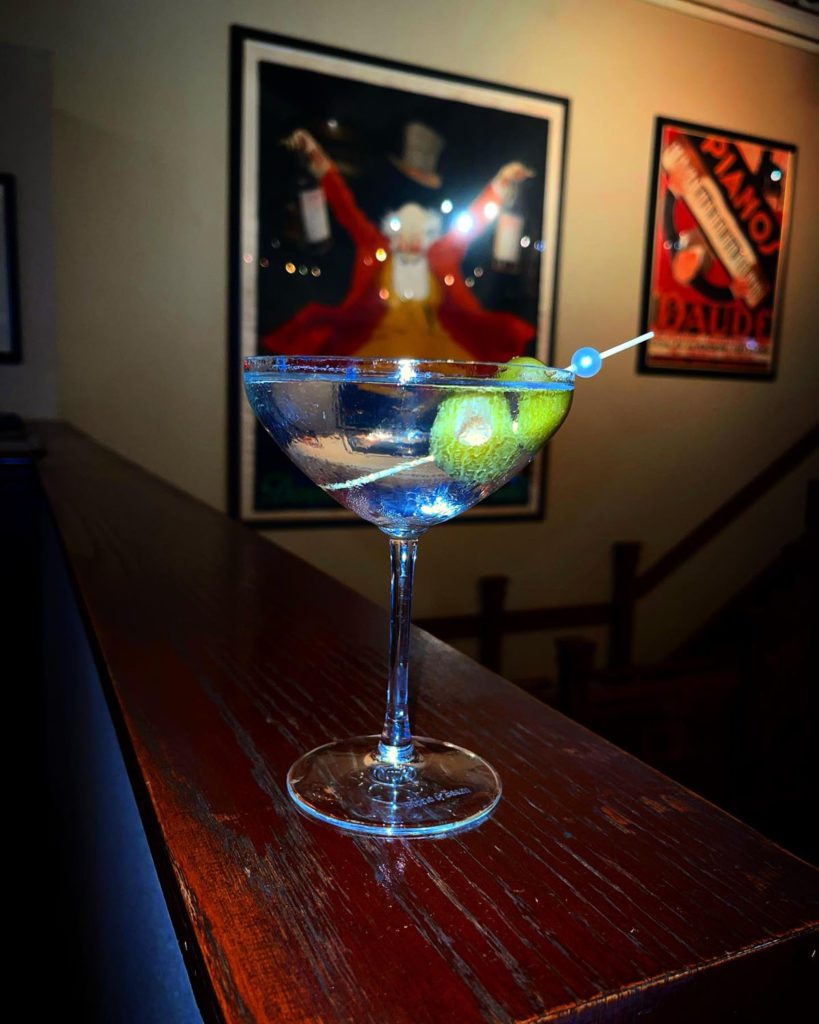
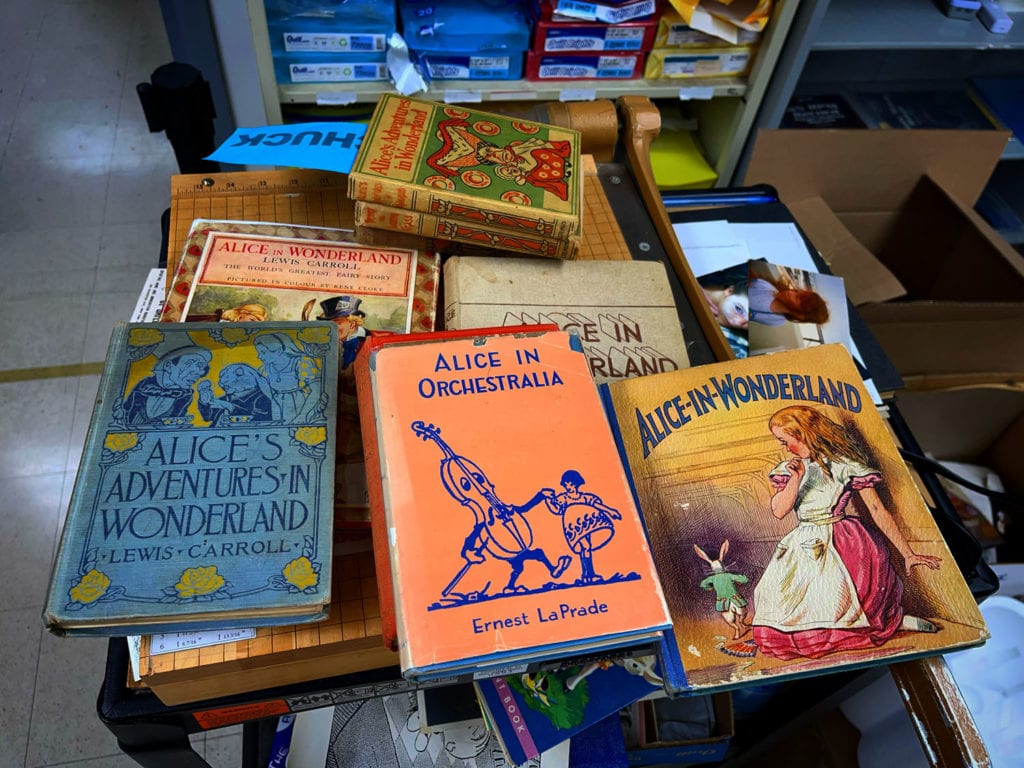
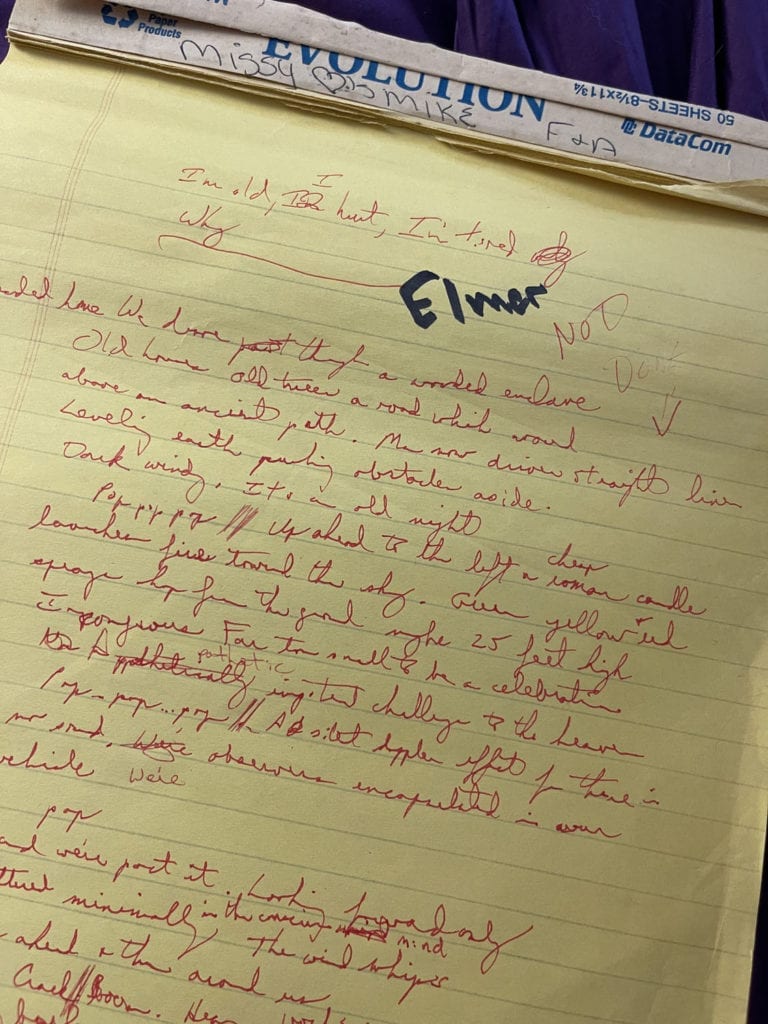
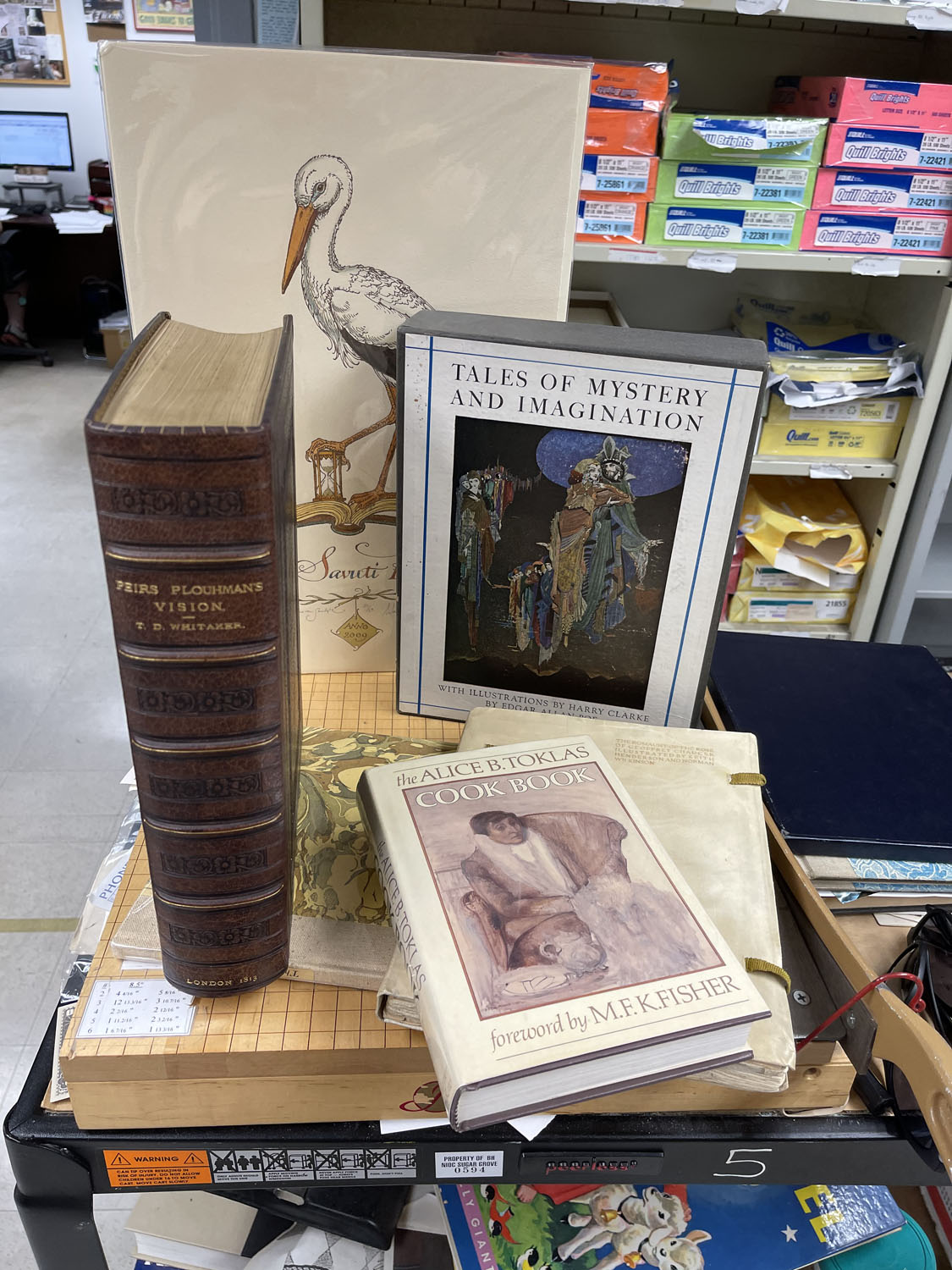
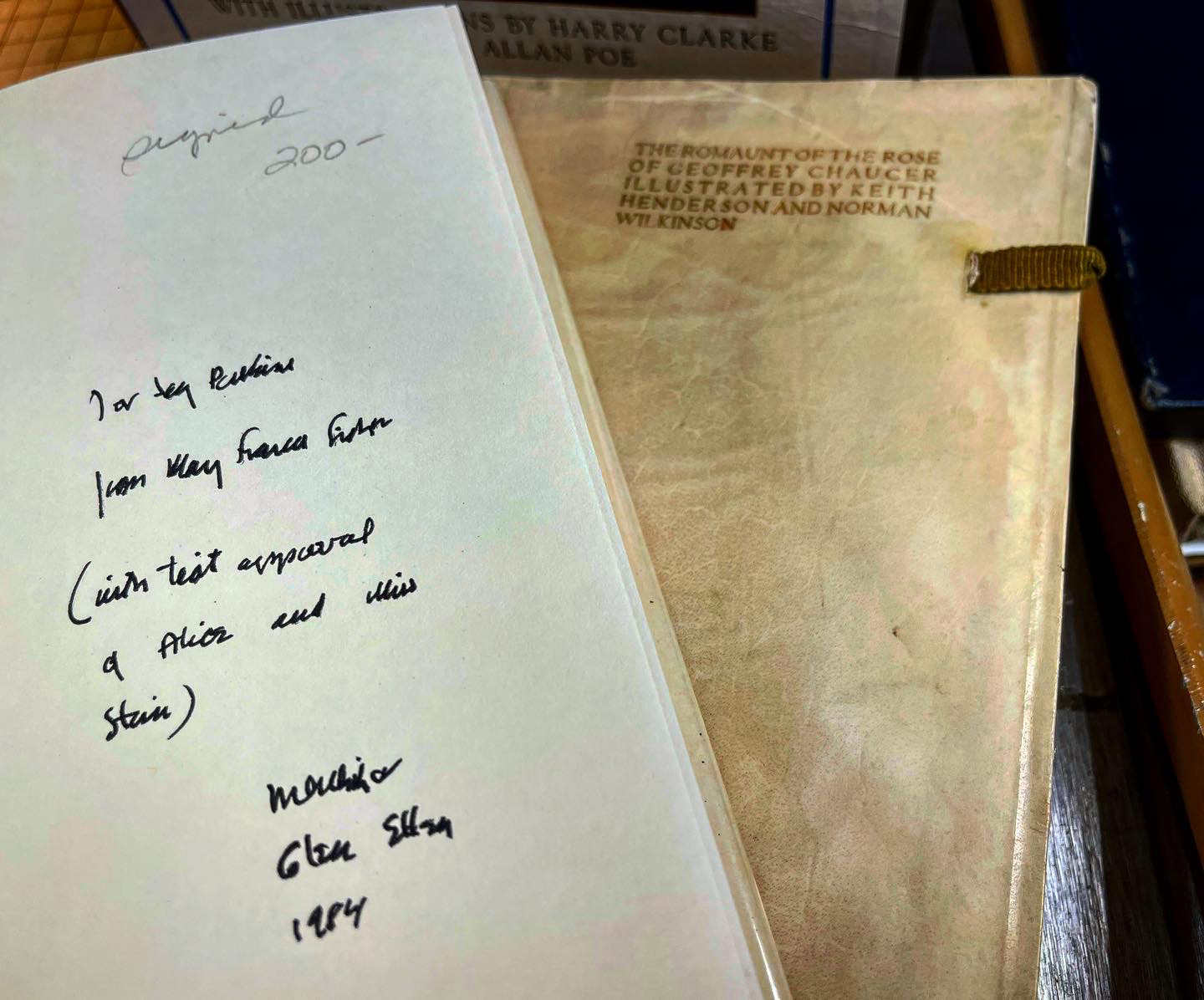
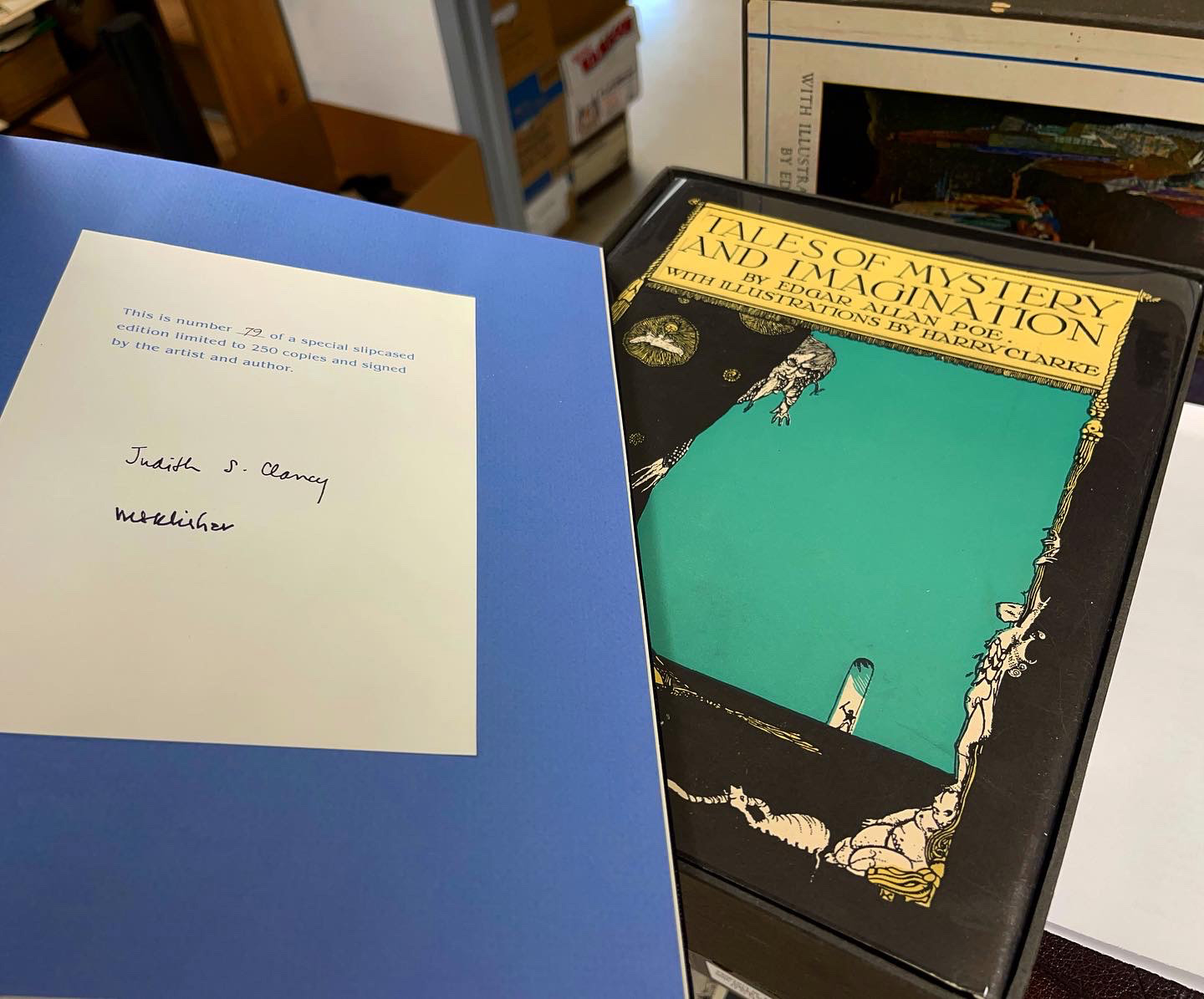
interesting history.
so many reasons why. and seldom the ones imagine.
perhaps very simple, if Elmer had met a Rose and not a Daisy, life would have been fulfilling for both.
the larger our worlds have become, the more narrow and less fulfilling with less access to good options, as few around us relate, can communicate basics, let alone think or speak out about the wrong to make better let alone right.
it saddened me few years ago to see senior that still trying and wanted good life, and the dump sick fat friend made bad decision, guy ended up in hospital, induced coma, misdiagnose as more common than not with seniors, among many others, and then dead, senior dog euthanized, another returned to shelter, life in dumpster, house sold for lovely property…now 2 owners later, forest ruined, house ruined, community ruined… all might have been different, or not.
That is so sad Virginia.
Thank you for reading and writing
Chuck
I’m related, distantly and through marriage, to the family that ran Frederick Trading. Your mentioning that long gone company’s old warehouse space triggered so many fond memories from far distant weekend visits to Frederick.
You’re doing god’s own work and it’s a delight looking through these weekly windows into your world.
Thanks Jeff
A neighbor across from the warehouse on Tilco had an old Frederick Trading trailer being used for storage
That company was a very important part of 20th century business in Frederick
Thanks for writing!
Chuck